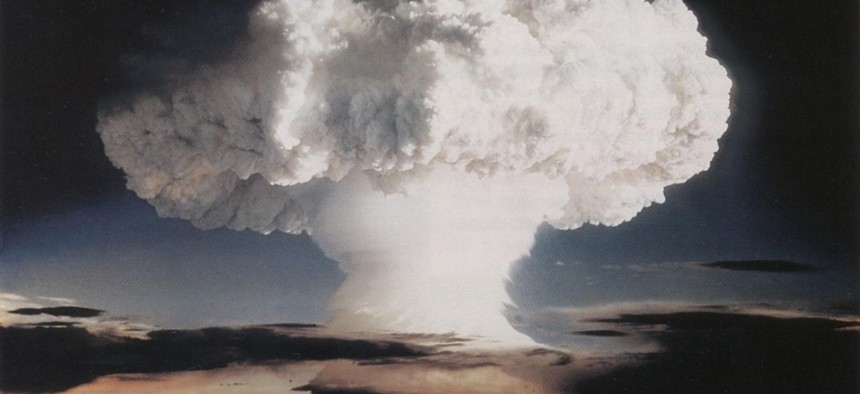
The first successful test of a hydrogen bomb was codenamed "Ivy Mike" in 1952 in the Marshall Islands. Comprehensive Nuclear-Test-Ban Treaty via Flickr
How Harry Truman Announced the Hydrogen Bomb in 1953
Here's how the U.S. president justified thermonuclear weapons—63 years before North Korea claimed to possess them.
Thermonuclear weapons, otherwise known as hydrogen bombs or H-bombs , are unimaginably ruinous. In 1952, the United States carried out the first successful test of such a device, which eclipses the lethality of atomic weapons by relying not just on a nuclear-fission explosion, but also a fusion reaction. The test obliterated an island in the Pacific Ocean. Nine years later, the Soviets tried out “Tsar Bomba,” a hydrogen bomb that yielded roughly 1,400 times the amount of energy released by the atomic bombs dropped on Hiroshima and Nagasaki. Soviet Premier Nikita Khrushchev had by then observed that “the explosion of one hydrogen bomb releases more energy than all the explosions effected by all countries in all the wars in the history of mankind.”
So you can imagine why it would be difficult to justify the development of such dastardly instruments of war. And yet a way is found. On Wednesday, North Korea announced that it had successfully tested its first hydrogen bomb. Nuclear experts and U.S. officials have cast doubt on that claim, suggesting the country may have instead detonated an atomic bomb, as it has on three previous occasions . But even if that’s the case, the North Korean government’s rationale for pursuing an H-bomb is worth considering. With the “stunning sound of the explosion,” North Korean leader Kim Jong Un reportedly wrote ahead of the test, his nation would be reasserting itself as a “self-reliant nuclear power.”
A government statement elaborated. Yes, nuclear weapons are dangerous and North Korea is “a genuine peace-loving state” that would never be the first party to use such weapons in a conflict, it professed. Yet North Korea had no choice but to acquire the world’s “most powerful nuclear deterrent” when its gravest adversary was a leading nuclear-weapons power. “The [Democratic People’s Republic of Korea]’s access to H-bomb of justice, standing against the U.S., the chieftain of aggression watching for a chance for attack on it with huge nukes of various types, is the legitimate right of a sovereign state for self-defense and a very just step no one can slander,” the statement argued.
To emphasize the point, the North Korean government added an aphorism: “Nothing is more foolish than dropping a hunting gun before herds of ferocious wolves.” (For more on the possible contours of the country’s nuclear strategy and doctrine, check out this helpful U.S.-Korea Institute study .)
Coincidentally, North Korea’s suspected nuclear test comes 63 years to the week after Harry Truman revealed the development of the H-bomb to the American public and the world. In a speech on January 7, 1953, the U.S. president announced that with the completion of U.S. thermonuclear tests in the Marshall Islands, “we have entered another stage in the world-shaking development of atomic energy. From now on, man moves into a new era of destructive power.” (The clip below is from a film the U.S. government released soon after the tests, which were known as Operation Ivy.)
The United States was not interested in offensively deploying so devastating a weapon, Truman assured his audience (assurance was warranted; only eight years had passed since the U.S. bombings of Hiroshima and Nagasaki). But alas, science only marched forward. And America’s unscrupulous archenemy, the Soviet Union, which had acquired the atomic bomb in 1949, would be marching right alongside it. Plus, the fate of global civilization was at stake. Absent an international agreement to renounce atomic energy as a tool of war, the U.S. “had no alternative ... but to press on, to probe the secrets of atomic power to the uttermost of our capacity.” Truman continued:
Such a war is not a possible policy for rational men. We know this, but we dare not assume that others would not yield to the temptation science is now placing in their hands.
With that in mind, there is something I would say, to Stalin: You claim belief in Lenin’s prophecy that one stage in the development of communist society would be war between your world and ours. But Lenin was a pre-atomic man, who viewed society and history with pre-atomic eyes. Something profound has happened since he wrote. War has changed its shape and its dimension. It cannot now be a “stage” in the development of anything save ruin for your regime and your homeland.
In 1949, shortly before Truman approved the H-bomb program after months of debate within his administration, Lewis Strauss, the chairman of the Atomic Energy Commission, made similar arguments in a letter to the president . “A government of atheists is not likely to be dissuaded from producing the weapon on ‘moral’ grounds,” Strauss reasoned, in reference to the Soviet Union. “The danger in the weapon does not reside in its physical nature but in human behavior,” he added. “Its unilateral renunciation by the United States could very easily result in its unilateral possession by the Soviet Government.” In conclusion: “I believe it unwise to renounce, unilaterally, any weapon which an enemy can reasonably be expected to possess.”
This, six decades ago and again today, is the inexorable, corrosive, compounding logic of nuclear deterrence and proliferation—the reason why a hydrogen bomb can take a couple years to build, while a world without nuclear weapons, as envisioned by Barack Obama and others, may take lifetimes to achieve, if it ever materializes. It’s why a man could shudder at the thought of a weapon capable of wreaking more destruction than the sum total of human warfare to date, and then proceed to construct that very weapon. The enemy is always a ferocious wolf and the hunting gun always a means of righteous self-defense, even as that hunting gun morphs into something else entirely.







